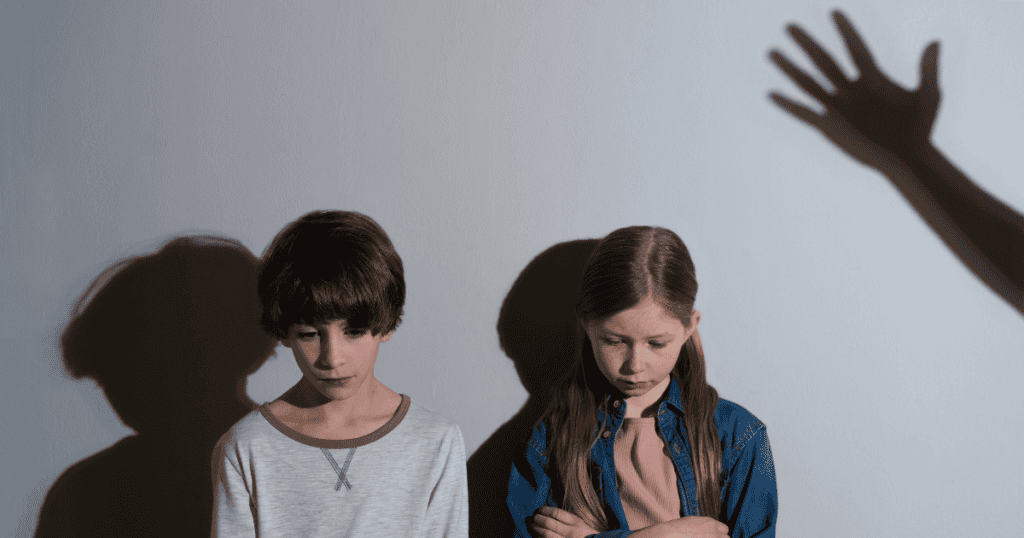You were never the problem. You were the one who saw the problem.
I can still picture one holiday dinner like it was yesterday.
My mother was retelling an old story, only she twisted it so the spotlight landed on me. I was labeled “difficult” again.
My younger brother shook his head at me, and everyone laughed while I sat there feeling like the problem child.
But the truth is, the real dysfunction in the family was never addressed.
The silent treatments, the backhanded comments, the control tactics.
All of it stayed invisible as long as everyone agreed I was the one to blame.
I carried the weight of secrets I didn’t create, while the actual issues sat untouched.
What I didn’t know then was that being scapegoated wasn’t about weakness. It was about power.
Narcissistic parents choose a scapegoat not because that child is flawed, but because that child sees too clearly.
And nothing terrifies them more than someone who won’t play along.
Table of Contents
Why Narcissistic Parents Choose a Scapegoat?

Narcissistic families operate like a carefully staged play.
The narcissist is the star, and every other family member has a role.
There’s the well-praised golden child, who can do no wrong.
There are the toxic enablers, who nod along to keep the peace.
And then, there’s the scapegoat.
The scapegoat is the lightning rod, the designated problem.
Every mistake, every fight, every uncomfortable truth gets redirected onto them.
That way, the narcissist can stay untouchable, blameless, and admired.
I remember countless dinners where my narcissistic mother would rewrite history on the spot.
She’d claim she worked herself to the bone providing for us, when I knew it was my dad who picked up extra shifts.
Even the smallest thing, like clearing my throat, could set her off.
She’d snap, ‘Don’t contradict me!’ and then the whole room shifted against me.
The story wasn’t meant to be accurate. It was meant to preserve her image.
And my job was to play the role of ungrateful daughter so she could remain the martyr.
Over time, I noticed the pattern.
The scapegoat carries not just blame but also everyone’s unspoken discomfort.
My toxic siblings could release their guilt by projecting it onto me.
Relatives could avoid conflict by silently agreeing that I was the problem.
It created a false sense of family unity, all at my expense.
And the cruelest part is, the more I resisted the role, the tighter they tried to bind me to it.
This choice isn’t random.
Narcissists don’t scapegoat the most obedient child. They scapegoat the one they can’t fully control.
The child who sees through the script, asks questions, and doesn’t give blind loyalty.
The Real Reason You Were Targeted by Narcissists

You Saw Through the Illusion
The first time I realized something was off, I was about ten.
My toxic mom praised herself for paying school fees in front of relatives, when I knew my father had quietly handled it.
She beamed with pride while my cousins from her younger brother’s family exchanged knowing glances with me.
Later, they whispered, “We know the truth. It’s not you.”
That moment lit a fire in me. I started noticing the cracks.
I saw how she exaggerated her sacrifices, downplayed my dad’s, and demanded constant recognition.
That ability to see through the illusion put a target on my back.
Narcissists survive by keeping their lies intact. And I was the one who could expose them.
You Questioned Their Authority
It didn’t take much to unleash her wrath. Sometimes, all I did was ask “Why?”
If she demanded we follow a rule that made no sense, I wanted an explanation.
My narcissistic siblings would stay quiet, but my questions were treated like acts of rebellion.
Authority, in a narcissist’s eyes, is sacred. It doesn’t need reasons. It only needs obedience.
Every time I asked for logic, she saw it as a direct attack.
But I wasn’t trying to start a war. I was just curious.
In her world, curiosity was dangerous.
You Refused Blind Loyalty

Blind loyalty was everything in my toxic family.
Agree without question, even if it hurts you. Smile and nod, even if it’s a lie.
One day, my controlling mother demanded I take her side in a feud she created with her sister.
Everyone else lined up behind her. Siblings, aunts, even cousins who just wanted peace.
I said, “No.”
That single word made me the villain.
From then on, I realized that in her system, loyalty mattered more than truth.
And when I refused blind loyalty, I became the narcissist’s greatest threat.
Your Empathy Threatened Their Control
The most unforgivable thing I ever did? I showed empathy.
My mother once humiliated my toxic younger brother in front of the whole family, picking apart his choices until he looked crushed.
I couldn’t stay silent.
Despite our differences, I stood up for my brother, sat with him afterward, and reminded him he wasn’t what she said he was.
In her eyes, that was betrayal.
By showing compassion, I exposed her cruelty. I disrupted the script where she held all the power.
Nothing enrages a narcissist more than being shown up by simple human kindness.
How Being the Scapegoat Reshaped You?

Being scapegoated leaves scars.
For years, I walked around convinced I was broken. I second-guessed myself constantly.
Even when friends praised me or coworkers valued me, a voice inside whispered, “What if they’re wrong? What if you really are the problem?”
But here’s the shift that changed everything: being scapegoated also gave me strengths I didn’t recognize at first.
It sharpened my perception. I can spot manipulation a mile away. It built resilience.
I learned how to survive storms that would have crushed others.
And it deepened my empathy.
Because once you’ve been unfairly blamed, you’ll do anything to make sure others don’t feel that same loneliness.
I also learned the power of independence.
When you grow up as the family scapegoat, you stop waiting for approval that will never come.
Instead, you begin building your own compass, your own sense of right and wrong that doesn’t depend on their shifting moods.
That independence later became my greatest weapon.
I could walk into workplaces, friendships, and even marriage, without needing constant validation.
Of course, the self-doubt lingered, but underneath it was a quiet strength. I knew I could stand on my own.
And that is something no narcissistic parent can ever take away.
Yes, the role damaged me.
But it also equipped me with tools my narcissistic parent never intended me to have: truth, clarity, and strength.
How I Broke Free From the Role They Cast Me In

The day I broke free wasn’t dramatic. It was quiet.
My mother twisted my words in front of relatives, as she often did, painting me as the difficult one.
Normally, I would defend myself until I was exhausted. But this time, I just went silent.
Inside, something clicked. I don’t have to play this role anymore.
I stopped fighting for fairness in a rigged game. I stopped explaining myself to people who didn’t want the truth.
And eventually, I walked away.
At first, the silence felt terrifying.
I worried that stepping away made me selfish, or that leaving the role would somehow prove her right.
But as the weeks went by, I noticed that the chaos stayed with them, while peace began to grow in me.
The role only ever worked if I agreed to play it. Without my participation, the script collapsed.
I leaned on my dad, who had always been quietly supportive.
I found validation from cousins who said, “We know what’s really happening.”
I built a safe life with my husband, who sees me clearly and doesn’t need me to shrink to fit a role.
Breaking free wasn’t abandonment. It was survival.
And it was the most empowering decision I ever made.
You Were the Truth-Teller All Along

Narcissists didn’t scapegoat you because you were weak.
They scapegoated you because you couldn’t be silenced.
Every accusation, every finger pointed at you, was an attempt to bury the truth.
But in the process, they revealed that the more they attacked you, the clearer it became who the real problem was.
On the other side of scapegoating, there is peace.
No more walking on eggshells.
No more forced loyalty.
No more pretending.
Just clarity, truth, and freedom.
And maybe that’s the greatest victory of all. The very voice they tried to shame, diminish, and break is the one thing they couldn’t destroy.
You carried truth inside you all along, and no smear campaign could erase it.
Every step you take now, toward independence, healing, and self-trust, is proof that they failed to silence you.
So when you look back at those years of blame, remember this: you were never the weak one. You were the strong one who refused to bow down.
You carried light into a house built on shadows. And light always wins.
And now, your voice, the very thing they tried to destroy, is your freedom.
Related posts:
- How to Heal After Being the Scapegoat of the Family? My Side of the Story
- Scapegoat of the Family: I Didn’t Allow Myself to Be a Victim and You Shouldn’t Either
- The Tragedy of a Narcissist Family Scapegoat: My Personal Experience and How I Overcame It
- Family Scapegoating Abuse: Nothing Is Permanent, I Survived and Thrived, so Can You!
- Why Am I Always the Scapegoat in My Family? And How I Got Out?


